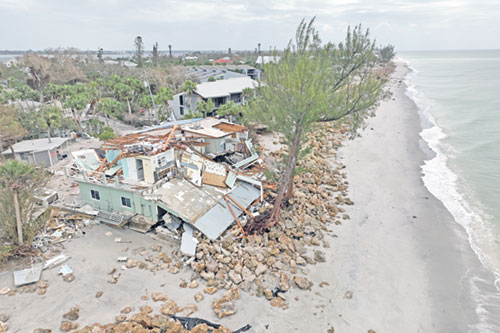Catholic Charities USA launches Hurricane Milton relief fund

A drone view shows a destroyed beach house in Manasota Key, Fla. on Oct. 11, after Hurricane Milton made landfall on Oct. 9. As homeowners assessed damage to their property, about 200,000 customers in Florida remained without power on the morning of Oct. 15. (OSV News photo/Ricardo Arduengo, Reuters)
(OSV News)—As Hurricane Milton took aim at Florida just days after Hurricane Helene, Catholic Charities USA (CCUSA) launched a dedicated disaster relief donation campaign.
CCUSA—the official domestic relief agency of the Catholic Church in the U.S. and a member of Caritas Internationalis, the Church’s global network of humanitarian outreaches—announced the fund on Oct. 9 as Milton churned across the Gulf of Mexico toward Florida with maximum sustained winds of 130 miles per hour.
The hurricane fluctuated in intensity and was a Category 4 by midday on Oct. 9, but it made landfall as a powerful Category 3 storm at 8:30 p.m. (EST) on Oct. 10 near Siesta Key, Fla., a barrier island next to Sarasota, bringing heavy rain, strong winds and powerful storm surges.
Milton flooded neighborhoods, destroyed homes and ripped the roof off Tropicana Field, home stadium for the Tampa Bay Rays baseball team. The field had been set up to shelter first responders. More than 200,000 residents in the state were still without power early on Oct. 15, with a death toll of at least 23. Initially after the storm struck, more than 3 million residents were without power.
AP reported that ahead of Milton’s landfall, more than 130 tornado warnings associated with the storm were issued by National Weather Services offices in Florida.
Donations to the CCUSA relief fund can be made on the agency’s website at ccusa.online/milton; by texting MILTON to 20406; or by mailing checks to CCUSA at 2050 Ballenger Ave, Suite 400, Alexandria, Va., 22314. Information about additional ways to give can be obtained by contacting CCUSA at 800-919-9338 or donations@catholiccharitiesusa.org.
“What we can say is the storm was significant, but thankfully, this was not the worst-case scenario,” Florida Gov. Ron DeSantis said early on Oct. 10 during a news briefing from the State Emergency Operations Center in Tallahassee. “The storm did weaken before landfall, and the storm surge, as initially reported, has not been as significant overall as what was observed for Hurricane Helene.”
Bishop Gregory L. Parkes of St. Petersburg closed Catholic schools and early childhood centers through Oct. 11.
The Diocese of Orlando closed its chancery and schools, with its Catholic Charities sites providing post-hurricane support by distributing ready-to-eat meals, tarps and water.
Milton hit Florida as the region is still struggling to recover from Hurricane Helene, which killed at least 230 across six states in September.
The National Hurricane Center reported that Milton weakened to a Category 1 storm as it swept through the state “and moved offshore.”
President Joe Biden—who approved requests for federal emergency declarations from Florida Gov. Ron DeSantis and Marcellus W. Osceola, Jr., chair of the Seminole Tribe of Florida—took an aerial tour over storm-battered parts of Florida on Oct. 13. He later delivered remarks in St. Pete Beach, one of the many communities along the west-central coast of Florida reeling after the one-two punch of hurricanes Helene and Milton.
In its Oct. 9 announcement, CCUSA said that “100% of all funds raised will be allocated to local Catholic Charities agencies, which will provide critical relief—including shelter, food and other humanitarian aid—to displaced and suffering members of their communities.
“Our brothers and sisters urgently need our prayers and our support as Hurricane Milton brings life-threatening conditions to Florida communities, some of which are still reeling from Hurricane Helene,” CCUSA president and CEO Kerry Alys Robinson said.
So far, CCUSA has distributed more than $1.9 million to Catholic Charities agencies in states affected by Hurricane Helene, and the agency said it “will stand by these communities through the long-term recovery.”
The agency said it responds to more than 60 disasters every year, ranging from hurricanes and tornadoes to fires and floods. †
